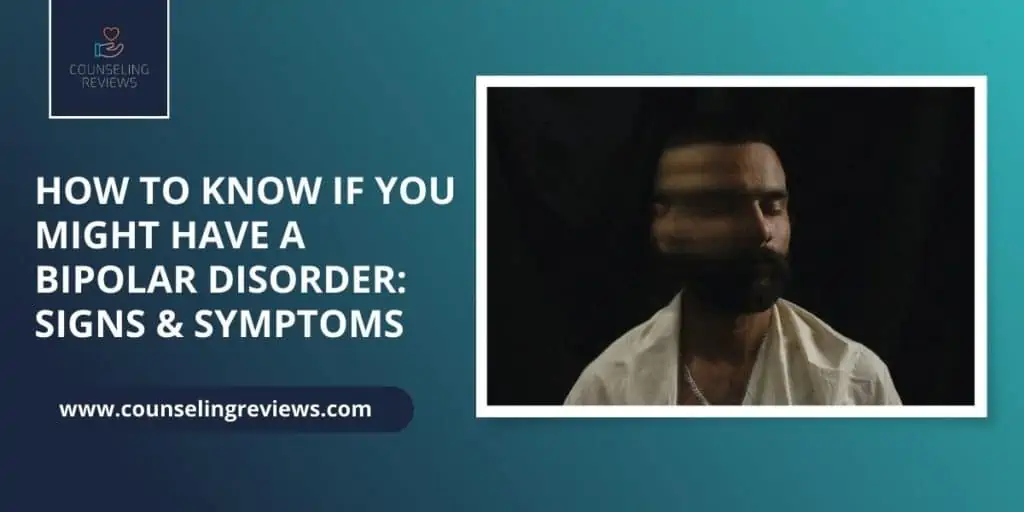Do you believe you have bipolar disorder just because you experience a few mood swings a week? Well, it’ll take more than that to diagnose you as bipolar.
So then, how can we be sure that our loved ones aren’t suffering from bipolar disorders too?
Don’t worry; we understand how much you love and care for your family, and we’re here to help you.
Continue reading to find out everything you need to know about the disorder. Knowledge is power, and health is the greatest wealth!
What Is Bipolar Disorder and How Does It Affect You?
Manic depression, or widely known as bipolar disorder, is a mental health illness that is characterized by severe mood swings.
The mood of an individual can range from emotional highs (hypomania or mania) to emotional lows (depression).
You may feel hopeless or dismal when you’re depressed, and you may lose hope in life. When your mood shifts to mania, you may feel exuberant, bursting with energy, or abnormally agitated. This may have an impact on your way of life and general well-being.
Bipolar disorder, unfortunately, is a lifetime condition. However, the good news is that by sticking to a treatment plan, you can control your mood swings. This disorder is commonly treated with psychotherapy or medication.
Signs and Symptoms of Bipolar Disorder
Bipolar disorder is a mental disorder characterized by mood fluctuations ranging from exhilaration to sadness.
Despite the label bipolar, a person with bipolar disorder may never experience a serious depressive disorder. A manic episode, on the other hand, is all that is required for a bipolar illness diagnosis.
We will now distinguish between the signs and symptoms of bipolar disorder including the episodes of mania, hypomania, and depression.
Signs and Symptoms of Mania and Hypomania
Although mania and hypomania are two different types of episodes, they come with many of the same symptoms. Hypomania is a milder form of mania.
Few or more of the following symptoms are present in both a maniac and hypomanic episode:
- Distractibility
- Abnormal upbeat
- Exaggerated feelings of happiness and self-assurance (euphoria)
- Racing thoughts
- Poor decision-making
- Increased energy
- Unusual talkativeness
Bipolar disorder symptoms differ from person to person, and they might change over time.
Sings and Symptoms of Depression
If you have bipolar disorder, you can experience more episodes of depression than mania, or the other way round. Symptoms might be so severe that daily duties become impossible.
The patterns are not usually consistent, and some people may encounter:
- Sad, tearful, lethargic, or hopeless moods
- Insomnia, or oversleeping
- Fatigue
- Loss of energy
- Unexpected weight loss or weight gain
- Feelings of worthlessness or guilt
- Poor decision-making
- Restlessness or restricted behavior
- Suicidal thoughts
- Losing interest in things previously enjoyed
Suffering from Bipolar Disorders
Bipolar disorder is a disorder characterized by extremes. A person with the bipolar condition may be completely clueless that they are experiencing manic episodes.
They may be surprised by their actions when the manic episode is ended.
Bipolar disorder symptoms are more frequent and severe for some people. Because of the severity of the disease, it may be difficult to keep a job, and maintaining relationships may be challenging. The risk of suicide is also higher.
Excessively heightened or lethargic moods can sometimes lead to psychosis. Psychosis is a serious condition that causes a person to experience hallucinations or delusions as a result of extreme mood swings.
A person suffering from psychosis may form a false reality and imagine that they did something bad. There’s a chance the person will hear or see things that are not there.
Symptoms in Children and Adolescents
Symptoms of bipolar disorder in adolescents and children can be difficult to detect. It might be difficult to identify whether they experience regular ups and downs, or bipolar disorders symptoms.
Children and adolescents may experience different types of manic episodes than adults, with different patterns. Quick moods swings are common during episodes.
However, severe moods swings that are different from their normal moods swings are one of the most obvious indications for the presence of bipolar disorder.
When To See a Doctor for Bipolar Disorder
People with bipolar disorders usually underestimate how much their mental instability affects their lives. However, it is a serious disorder that is necessary to be treated.
If you’re showing signs of bipolar disorder talk to your doctor or any mental health professional. Bipolar disorder doesn’t improve by itself. Treatment from a professional can assist you in managing your symptoms.
Suicidal thoughts are more prevalent in people with bipolar disorder, so, if you feel like you’re leaning toward suicide, don’t hesitate to dial 911, go to the hospital, or talk to your relatives or friends right away.





